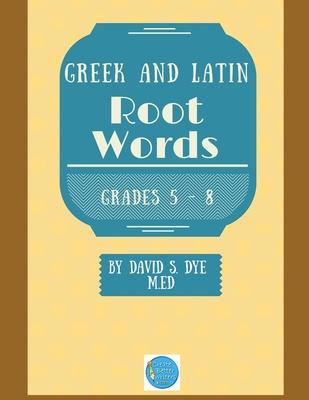Objective: The purpose of this book is to help students improve their vocabulary by learning more than fifty Greek and Latin prefixes, suffixes, and root words. Best for Grades 5 - 8.
With this knowledge, students will learn to identify these root words and use context clues to identify the meaning of thousands of words that contain these roots. Students will be given a mix of direct instruction learning root words and practical application using the root words. This two-part approach will give the students the best opportunity to make learning and using root words a regular part of their lives.
Introduction:
Every year I tell my students a story about an experience I had while in college regarding learning the word "somnambulism." A newspaper headline read "Dodgers Suffer from Somnambulism!" Not knowing what the word meant, I began to break the word into parts. I write the parts of the word on the board: "Somn" is found in "insomnia". "In" means "not". Since insomnia means "un able to sleep", somn must mean "sleep." Next, there is "amble" which I know means "to walk". Finally, there is "ism" which can refer to "a condition of". Put them together, and what do you get? Somn - Sleep / Amble - Walk. Oh, the Dodgers must have been sleepwalking through their game.
This book uses a similar process to help students decipher thousands of words that they would normally need to look up in the dictionary. This can only help lead to a much broader vocabulary for students using this book.
Unit 1 - Greek and Latin Prefixes and SuffixesThe purpose of this section is to show students the difference between prefixes and suffixes. Prefixes change the meaning of words while suffixes change the word's part of speech. Take the word "happy". Adding the prefix "un-" changes the meaning of the word to "not happy". Adding the suffix "ness", making "happiness", keeps the meaning, but changes the word from an adjective to a noun. Knowing this difference is an important step in developing an instinct for using root words on a regular basis. Within this section, students will be given dozens of prefixes and suffixes to learn. They will break words into parts and analyze how the pieces come together. They will practice making educated guesses of definitions to high level vocabulary words and use a dictionary (Internet or hard cover) to confirm the accuracy of their answers. Next, they will practice seeing these high level words in context, and finally, use these words themselves in their writing. Unit 2 - Greek and Latin Root Words
In this section, the students are given a list of twenty-four Greek and Latin root words. Each root word has three English words that use each particular root. The teacher can choose to have the students learn them all at once and test them at the end, or she can assign a few each week and learn them over the course of the year. For each of the sets of root words, the students can use the worksheets to help them practice learning the words. The students will write the words and definitions, then draw a study picture to help them internalize the words. Unit 3 - Greek Root Words (4 Week Unit)
Each week, students are given three sets of words. Each set contains a root word and five English words that use those root words. There is also a spelling routine that gives the students activities to practice each day to become familiar with the words. These activities actually take about two weeks to finish if they are done 10 - 15 minutes a day. Therefore, at the end of the first week, the students take a spelling test. Next, the students use the second week to complete vocabulary activities until they are ready for the vocabulary test at the end. You can also choose to give the spelling and vocabulary test together at the end of the second week.
